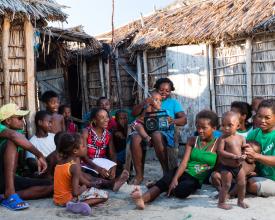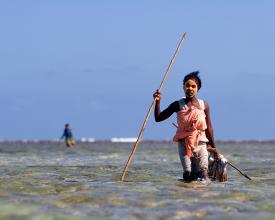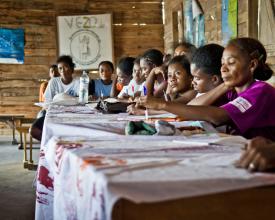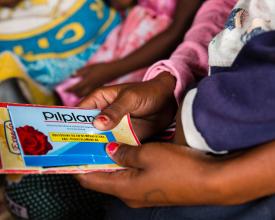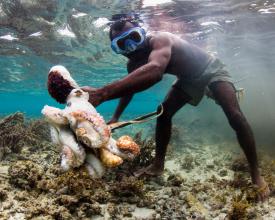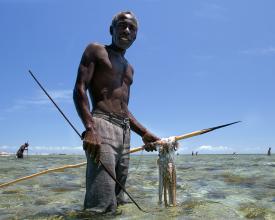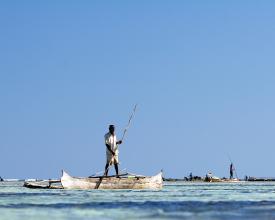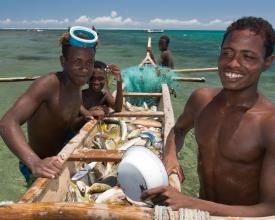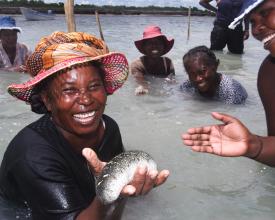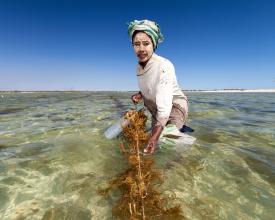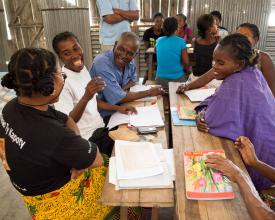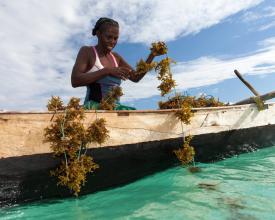
Integrating community health services with local marine management efforts
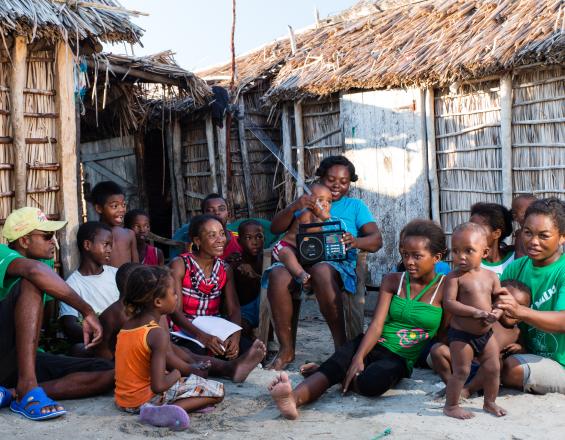
This solution integrates community health services with local marine management and coastal livelihood initiatives.
This holistic health-environment model enables previously under-served communities to access family planning services so that they can choose freely the number and timing of their births. It improves their health while equipping them with the skills and opportunities they need to manage their natural resources sustainably.
It's being implemented through cross-sector partnerships between health and environmental organisations in a variety of contexts. Programmes are designed to respond to priority community unmet needs and remove barriers to participation in local marine management.
Context
Challenges addressed
This solution responds to the interconnected challenges of poor community health, unmet family planning needs, food insecurity, environmental degradation and vulnerability to climate change.
Location
Process
Summary of the process
Blue Ventures’ health-environment model is an holistic approach with several components vital for its success:
- The provision of voluntary family planning and other basic health services enables people to choose freely the number and timing of their births, and removes a barrier to community engagement in local marine management.
- LMMAs are the core of Blue Ventures’ locally led approach to marine conservation, and integrate closely with the other components. As explained by Mr Roger SAMBA, president of the Velondriake LMMA Association: “Family planning lets couples choose how many children they have, while marine reserves help to increase fish catches. If the population isn’t growing so rapidly and the fish catches are increasing, then we can have a better balance between fish stocks and our population. This means that people and the environment can live together, and we all benefit from this.”
- Seaweed and sea cucumber farming provides communities with new sources of income so that they can diversify their livelihoods, thereby improving community well-being and enhancing the sustainability of local marine management efforts.
Building Blocks
Family planning and community health service delivery
The purpose of this building block is to provide all of Blue Ventures’ partner community members with access to voluntary family planning and other basic health services. In collaboration with Population Services International we have trained and are currently supporting networks of local women to offer family planning information and short-term contraceptives (condoms, hormonal pills and injections) in their villages. We also partner with Marie Stopes Madagascar to offer long-acting reversible contraceptives (hormonal implants and intra-uterine devices) on a regular basis. Our community-based distributors of contraceptives are also trained and supported to provide antenatal and postnatal education, mosquito nets, water purifying solution, oral rehydration salts and antenatal medication.
Enabling factors
We established this community health and family planning initiative in direct response to unmet needs articulated by local women and girls. Our strong and trusting relationships with coastal communities, built through several years of working alongside them on fisheries management and marine conservation efforts, enabled us to expand our programmes to include reproductive health with their full support. We were able to leverage our existing operational infrastructure and human resources to pilot this initiative at a very low cost.
Lesson learned
Our experience demonstrates how collaborating with health agencies, and drawing on existing operational infrastructure and strong community relations can establish a low cost and locally responsive health programme.
- Integrated community outreach combining health and environment topics: we have experimented with a variety of approaches and found small group discussions to be particularly effective. In the early days we focused more on mass mobilisation events which were good for raising awareness but less appropriate for stimulating deeper discussion and behaviour change / community ownership.
- Building effective cross-sector partnerships: we have learned that open lines of communication are important for building trust. This included us (as a conservation organisation) affirming our commitment to upholding reproductive rights which is often a major concern of health partners. Cross-training allows conservation partners/staff to understand and support the health work and vice versa.
Temporary octopus fishery closures
The purpose of this building block is to provide Blue Ventures’ partner community members with positive experiences of marine management, demonstrating that it can yield tangible economic benefits in reasonable timeframes. The short-term octopus fishery closure model involves periodic closures of a portion of a village’s octopus gleaning grounds. At any communally agreed time, up to a quarter of a community’s fishing area may be closed for around three months. This approach has been shown to result in dramatic increases in octopus landings and improved fisher incomes when closed areas are reopened to fishing (Oliver et al., 2015), thereby sparking and building enduring support for more ambitious marine management efforts (including the creation of permanent marine reserves within locally managed marine areas) that are led by communities, for communities. By returning meaningful economic benefits in timeframes that work for traditional fishers, these temporary octopus fishery closures inspire local leadership in marine conservation. The approach depends on and benefits from broad support from the entire seafood supply chain, with fishers and buyers now contributing to the modest costs of establishing and managing the closures.
Enabling factors
- Support from seafood collection and export companies, as they coordinate their collection schedules with the reopening of closures and pay a premium price for octopus on the opening days.
- Leadership of the village president, who mobilised his community to experiment with closures. When the fishing ground reopened, the village experienced increases in both octopus landings and fisher incomes. As news of this fishery boom spread, neighbouring communities started adopting the approach.
Lesson learned
This building block works by demonstrating that fisheries management can yield meaningful economic benefits for communities and seafood buyers, in realistic timescales. Only by making this connection can marine conservation be sustained and scaled beyond its current limited scope. We started in Andavadoaka monitoring the state of coral reefs but soon realised that we needed to address pressing community concerns about food security and livelihoods before having a conversation about marine conservation. This is why we started with a temporary octopus fishery closure in a portion of a single village’s fishing grounds and discovered that this provided an effective foot-in-the-door for marine conservation by inspiring communities to engage in more ambitious management efforts. Thus, we started with what was important for communities and saw that lead to a more sustainable and socially meaningful form of management than traditional top-down protection efforts.
Locally managed marine areas
Locally Managed Marine Areas (LMMAs) are zones managed by coastal communities to help protect fisheries and safeguard biodiversity. Through the use of Dina – customary laws that are recognised by the Government of Madagascar –partner communities have designed effective rules that can be enforced locally to ban destructive fishing practices, protect endangered species and designate priority marine areas for protection. To ensure the long-term financial sustainability of LMMAs, a variety of mechanisms including marine ecotourism programmes, seafood supply chain incentive schemes, eco-certifications for sustainable fisheries, and payment for ecosystem services are developed. Velondriake is Madagascar’s first LMMA where elected representatives from 25 villages have put in place a management plan that includes permanent reserves, temporary octopus fishery closures, community-based aquaculture of seaweed and sea cucumbers, all regulated through a series of locally developed and enforced rules (Dina). Preliminary protected status was granted by the Government of Madagascar in 2010 and definitive protected status was successfully acquired in 2015.
Enabling factors
Community motivation for creating LMMAs has been established throughtemporary octopus fishery closures, which boost octopus landings and fisher incomes. The legal basis for LMMAs is the use of Dina – customary laws recognised by the Government – with additional frameworks allowing LMMAs to be formally designated as community managed protected area. Effective community management is supported through Madagascar’s national LMMA network, which facilitates exchanges and forums to share experiences.
Lesson learned
Managing fisheries and marine resources works best when responsibility is placed in the hands of local communities. This is particularly true in low-income countries where there is often limited capacity and infrastructure for fisheries management and marine conservation. Our experience in Madagascar has shown that peer-to-peer learning is a highly effective tool for building local capacity and confidence in marine conservation.
Community-based aquaculture
Enabling factors
Lesson learned
Impacts
- Contraception use among sexually active women of reproductive age in the Velondriake LMMA (Blue Ventures' first site in Madagascar) has increased more than fivefold from less than 10% in 2007 to over 50% in 2016.
- More than 4,000 unintended pregnancies are estimated to have been averted among a population of 45,000 to date (all of Blue Ventures' sites in Madagascar).
- Family planning users report having better physical and mental health, being able to work more, earn more money and better provide for their children.
- Women and youth now make up 85% of the Velondriake LMMA’s management association.
- Blue Ventures is assisting other organisations to adopt this approach by supporting the development of a national learning network in Madagascar, bringing together health and environmental groups, funders and policy makers to facilitate cross-sector partnerships.
Beneficiaries
Women of reproductive age, their partners and their families
Sustainable Development Goals
Story
Irene was in her final year of secondary school when she had her son, now four years old. She didn’t manage to take her school leaving certificate then, and was left feeling like her efforts in primary school had been quite futile. She decided to start using family planning after the birth of her son, choosing three-monthly depo-provera injections offered by the community-based distributor of contraceptives in her village. Once Irine took control of her reproductive health, she found that her business ideas thrived, her confidence grew, and she became able to provide for her son. To earn money, Irene grows seaweed and sea cucumbers through an initiative supported by marine conservation organisation Blue Ventures. She describes how their private sector partner, a company called Indian Ocean Trepang, provides juvenile sea cucumbers for local farming teams to grow out to adult size in community-managed pens. Irene also has a small business selling products that she sources from outside of the village, with her mother looking after her son while she’s away. Thanks to these efforts, she’s been able to build a large house with four rooms, buy several goats and pay for her son’s school fees. Irene isn’t yet married but she’s very clear about one condition before she gets engaged; that she can continue to use contraception until she’s ready to have another child. She even approached a lady in her community with limited resources and many children to support, as she felt sorry for her and wanted to speak to her about family planning. The lady was wary: “According to the rumours here in this village, using contraception will destroy your body so I’m fearful about it.” Irene explained that this is only a rumour: “I’m using the contraception that you’re scared of and you can see that I’m healthy, there hasn’t been a change in my body and I’m able to do many activities!” The lady agreed on the condition that she would speak to her husband first, who accepted willingly, saying that he didn’t want his wife to suffer anymore. This lady is still happily using family planning today, and Irene continues to help by reminding her of the follow-up appointments noted in her medical book as she’s unable to read. Having experienced the benefits of using family planning herself, Irene is dedicated to encouraging other women in her village to think about their options and realise their reproductive rights. (Photo-illustrated story: https://blueventures.exposure.co/irenes-story)
